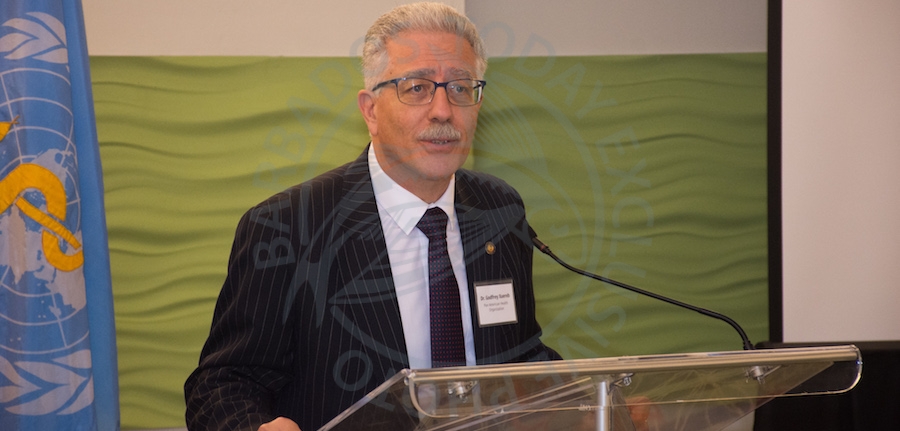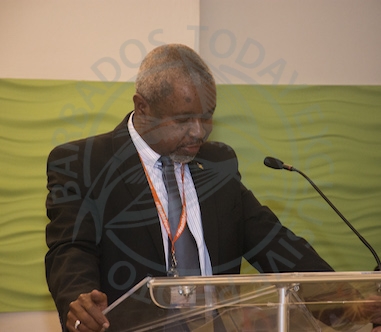The Eastern Caribbean which includes Barbados has become one of the first regions in the world to be officially recognized as having eliminated mother-to-child transmission of HIV/AIDS and congenital syphilis, a senior regional health official has revealed.
But health officials here have also sounded an alarm on the decline of the national birth rate, even as health care improves and access to birth control widens.
Resident Representative of the Pan American Health Organisation (PAHO) for Barbados and the Eastern Caribbean, Dr Godfrey Xuereb, made the revelation this morning as health experts began a meeting on how to improve perinatal care in the region, at the Radisson Aquatica Hotel.
[caption id="attachment_289322" align="aligncenter" width="400"] Dr Godfrey Xuereb[/caption]
Dr Godfrey Xuereb[/caption]
Dr Xuereb said: “Only 20 years ago, the Caribbean was classified as having the second highest rate of mother-to-child HIV/AIDS transmission in the world, so in less than a generation we have brought the Caribbean to being certified free or having eliminated this. It is a huge public health gain to know that every child born in most countries in the Eastern Caribbean has a very low risk of being infected with HIV or congenital syphilis, that every mother is being screened and being treated if found to be HIV positive. This is important for policy making in the future.”
Acting Chief Medical Officer, Dr Kenneth George, said Barbados had also done well in ensuring that the staff in the hospital’s neonatal intensive care unit was adequately trained, and that the majority of children born were of a healthy birth weight.
[caption id="attachment_289323" align="aligncenter" width="381"] Dr Kenneth George[/caption]
Dr Kenneth George[/caption]
Said Dr George: “Between 2013 and 2017, 85 percent of babies born weighed between 2500 grammes and 4000 grammes, which is considered normal birth weight. 3.5 to 4.5 per cent weighed more than 4000 gramnes. On the other end of the scale, 10 per cent were between 1500 and 2500 grammes, which is defined as low birth weight, while 1.5 to 2 per cent fell below that size, which is considered very low birth weight.”
But Dr George expressed concern at the fact that overall, the number of children born in Barbados had dropped between 2007 and 2017.
The chief medical officer: “In 2007, there were 3258 births recorded, and within ten years this dropped to 2346, a 15 per cent decline.”
Dr George attributed the decline to falling fertility rates, declining birth rates and universal access to contraception.
He warned that this low birth rate, along with an ageing population, could have implications for the island’s ability to meet its future development goals.
Dr George said the Ministry of Health and Wellness will start a national dialogue “to work out a national solution to this dilemma”.
The meeting is expected to bring together the Ministries of Youth and Community Empowerment, Finance and Economic Affairs, National Insurance Scheme, the Welfare Department, and the Ministry of People Empowerment and Elder Affairs.
The two-day perinatal care conference is being held under the auspices of the World Pediatric Project, PAHO/WHO, and the Rotary Clubs of Barbados West and West Richmond, Virginia in the United States.
Executive Director of the World Pediatric Project in the Eastern Caribbean, Dr Lauren McIntosh, said her organisation started its work in the region in 2002 in St Vincent, and had since spread to St Lucia, Dominica and Grenada.
Dr McIntosh said: “We have provided ($116 million) US$58 million in services to the Eastern Caribbean, we send 25 surgical and diagnostic teams to the region annually, and we have facilitated neonatal observership in the US . . . (at) St Louis Children’s Hospital and Cardinal Blenheim Hospital, and at the Queen Elizabeth Hospital here in Barbados.”
The post Neonatal care improving, but birth rate dropping appeared first on Barbados Today.
from Barbados Today http://bit.ly/2MUFsXU
via IFTTT http://bit.ly/2SznYpb

No comments: